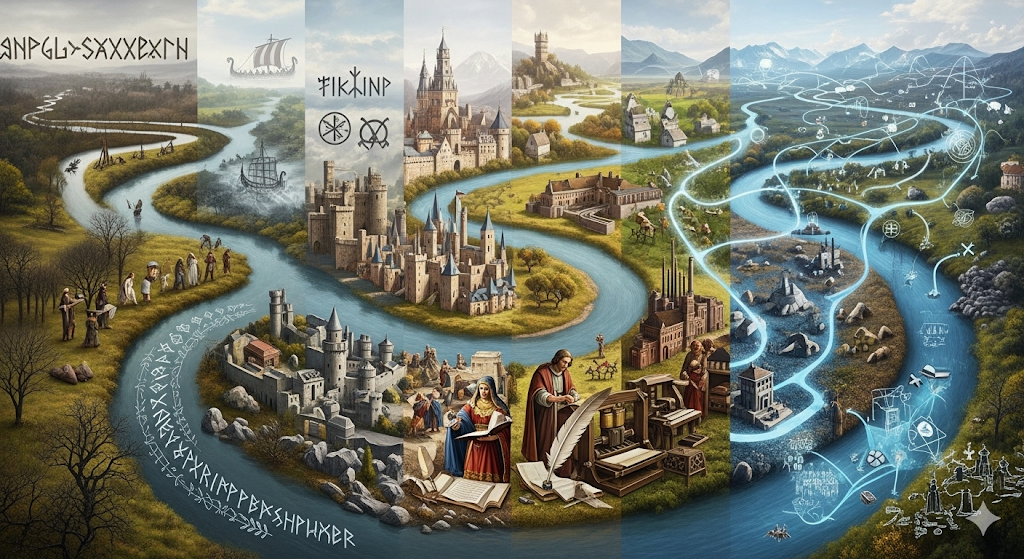Origin of English by Iqram Hossain Nishat
Like the constantly changing norms of society, language is also ever-evolving. Over time, and through cultural exchange, language continually transforms. This is true for Bangla, and it's equally true for English as well as other languages. Like Bangla, English has been, is, and will continue to be influenced by other languages and cultures over many years.
ENGLISH
Iqram Hossain Nishat
9/10/20253 min read
Like the constantly changing norms of society, language is also ever-evolving. Over time, and through cultural exchange, language continually transforms. This is true for Bangla, and it's equally true for English as well as other languages. Like Bangla, English has been, is, and will continue to be influenced by other languages and cultures over many years.
Old English (5th-11th Century)
The earliest form of the English language is Old English, which emerged in the 5th century with the arrival and intermingling of several Germanic tribes (eg. the Angles, Saxons, and Jutes) in England. Although the vocabulary is very different, the grammar of modern English is still fundamentally built upon this Old English base. The most famous literary work written in this language is Beowulf.
Old English was much like German or Nordic languages (e.g., Swedish, Danish, etc.) and is almost completely different from modern English. For example, here's a sentence translated into both Old and modern English:
Old English: "Hwæt segst þū? Ic ne understande þæt."
Modern English: "What are you saying? I don’t understand that."
Middle English (12th-14th Century)
The Middle English period began in 1066 when the so-called "Norman" French occupied England. Since French was the language of the new nobility and administration, a large number of French words entered Old English, and its grammar was simplified and changed. The collection of stories titled The Canterbury Tales by the author Geoffrey Chaucer is considered a prime example of this transitional form of the English language.
Early Modern English (15th-18th Century)
The Early Modern English period began around the same time as the European Renaissance. With the introduction of the printing press in England, the standardization of grammar and spelling accelerated. Under the influence of the Renaissance, many Greek and Latin words also entered the English vocabulary.
Additionally, a major change in the pronunciation of English vowels occurred during this time, known as the Great Vowel Shift. This shift caused English pronunciation to begin to take on its current form. The literary works of William Shakespeare and the King James Version of the Bible also played a significant role in the evolution of the English language during this period.
Modern English (18th Century - Present)
After 1700, the English language gradually began to take its current shape. The publication of Samuel Johnson's A Dictionary of the English Language in 1755, along with other dictionaries and grammar books, helped to further standardize and simplify the language.
The new scientific, technological, socio-economic, and political ideas that emerged during the European Age of Enlightenment and the Industrial Revolution also led to the creation of many new words to describe these concepts. At the same time, the expansion of the British Empire carried the English language beyond England's borders to various parts of the world. After the fall of the British Empire, the influence of American media and pop culture from the 20th century onwards continued the expansion and development of the English language.
However, with the recent rise of the internet and social media, the evolution of English has been accelerating. This is particularly noticeable in the decentralization of its development and the increasing influence of slang and colloquialisms. This is especially true for the Millennial and Gen-Z generations. The impact is so significant that many Gen-Z slang words have been officially recognized by the Oxford and Merriam-Webster dictionaries.
Reviewing the history of English and any other language makes it clear that language is a living document of human societal evolution. It not only carries traces of our past but also reflects our thoughts and socio-economic structures.
While studying language can be quite tedious, learning about its history is relatively more interesting. It allows us to learn a great deal about our history and present-day society and culture, and it even helps us predict what might happen in the future.


Na Shikhle Kemne Ki
Sher-E-Bangla Nagar, Dhaka
+880 1715 440454
contact@nskkbd.com
বাংলায় পড়ুন
